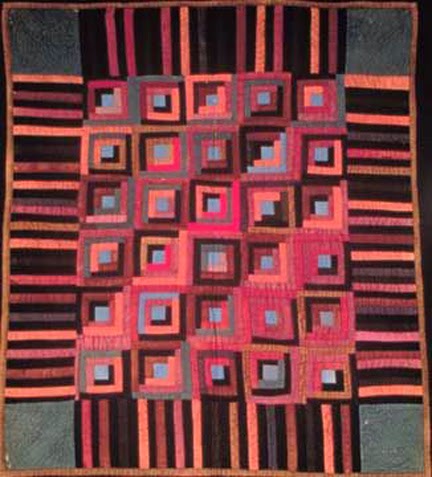Sarah Furman Warner quilt
Collection of the Metropolitan Museum of Art
Elaborate borders are a hallmark of quilts made before the
Civil War.
Quilt dated 1847 Mary Ann Grooms
Amish crib quilt, Illinois State Museum
The Amish working after 1880 also emphasized
wide borders.
Although these quilts were designed for beds,
their borders give them a neat, framed finish.
The blue "spacer" border with wider outer border has become
a standard for quiltmakers in recent decades.
Amish quilt show at the Textile Museum
Paintings by Clyfford Still
In contrast to abstract painting exhibited with no frames...
Robert Motherwell paintings at the Museum of Modern Art
...or minimal frames of strips of wood or metal.
Prism by Weeks Ringle and Bill Kerr
Many modern quilters advocate an unframed composition.
Among them Weeks Ringle and Bill Kerr
"Many designs become static when surrounded by borders."
http://books.google.com/books?id=xTLKr6nMTfMC&pg=PA15&lpg=PA15&dq=modern+quilt+border&source=bl&ots=qMbCcqlzEn&sig=fPX42MaKUGvTfwD05ePop7tHHmY&hl=en&sa=X&ei=0KIHU6H1Gqr4yAGf84HwCA&ved=0CIABEOgBMAs#v=onepage&q=modern%20quilt%20border&f=false











Once again you have opened my eyes to a design detail and element. I have often am drawn to quilts and art without borders. Thanks for an informative post. Love them!
ReplyDeleteAt least in the online photo, the optical play in that pink and charcoal Amish quilt at the Illinois State Museum is fabulous and fascinating. Thanks for the image.
ReplyDeleteAre borders still "frames" when only seen hanging down the sides of the bed and not on the top? I wonder if modernists would consider having a different design on the "drop" to be something other than a frame. I'm someone who's often more interested inthe borders than the centers of quilts.